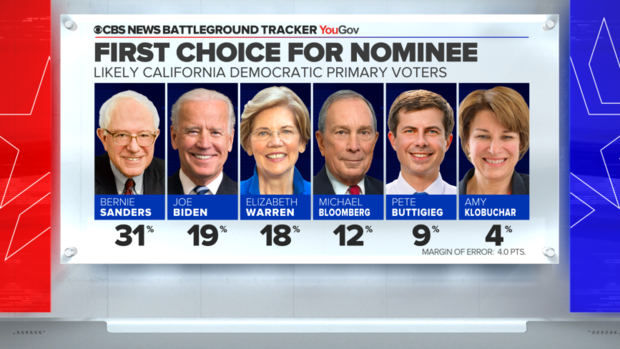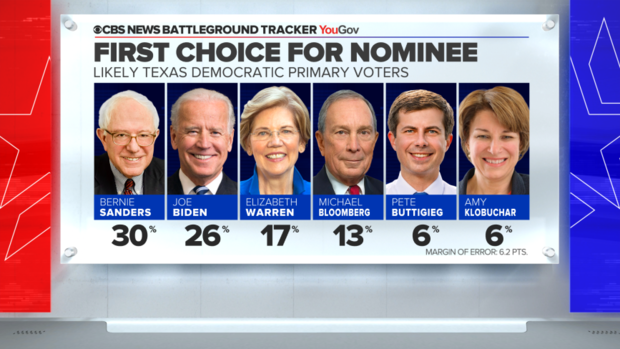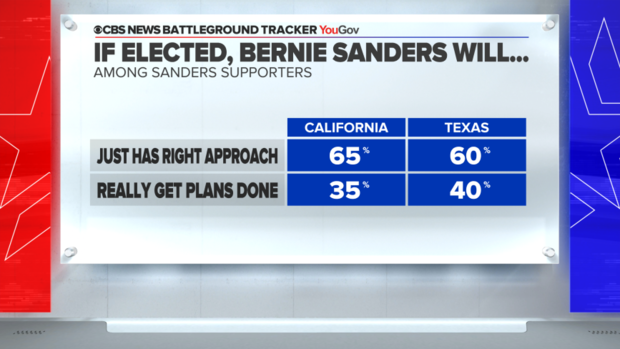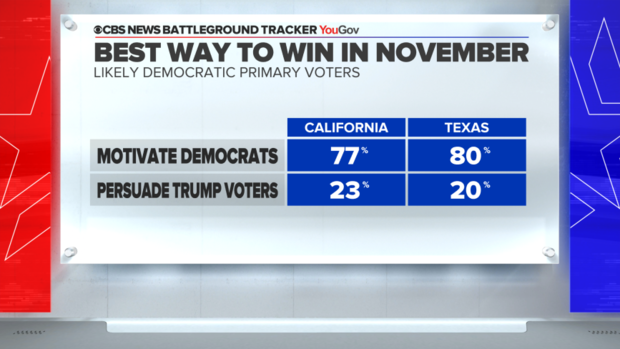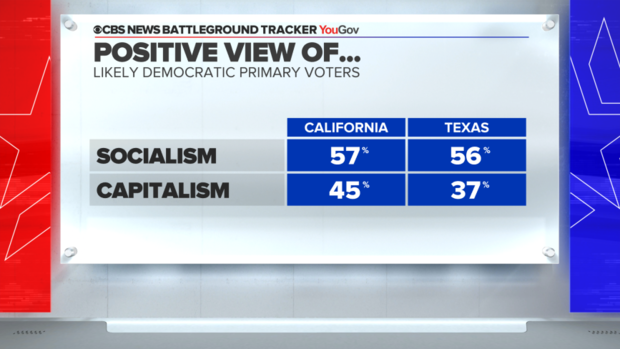CBS News Battleground Tracker poll: Sanders and Biden in fight for big prizes of California, Texas
With Super Tuesday only two days away, Bernie Sanders leads in both California and Texas, the two states that will award the most delegates when 14 states go to the polls on Tuesday. In California, Sanders holds a 12-point lead over his closest rival, Joe Biden. Polling in these two states concluded before Biden's victory Saturday night in South Carolina, though few voters said those results would impact their decision.
Sanders also leads the field in Texas, though in this state he enjoys just a four-point edge over the former vice president. About half of voters in both states say they have definitely made up their minds already, and many have already cast their ballots.
These support levels would translate into a substantial delegate lead for Sanders. We estimate that his current support in California would yield nearly half of the state's massive delegate prize, with Biden and Elizabeth Warren splitting the rest. In Texas, voters' current intentions translate into a narrower delegate lead for Sanders over Biden, with Warren trailing them. And Mike Bloomberg, who is just under the 15% delegate threshold statewide, is in position to pick up delegates in specific districts, as many as a few dozen in his better simulations.
In both states, Sanders is seen as best able to address the issues and concerns of young voters, Hispanics and working class voters. Biden is seen as best able to address the concerns of black voters, while Warren is seen as best able to address the concerns of women. Voters in California and Texas trust Sanders best to handle a number of issues, particularly health care and climate change. When it comes to Sanders' plans, majorities of his supporters in California and Texas think he has the right approach, even if he won't get all of his initiatives done if elected.
As has been the case in other contests, Sanders is boosted by solid support from younger voters. Nearly half of voters under 45 in California — and more than half in Texas — pick Sanders as their first choice. In California, Sanders is the first choice among white and Hispanic voters, while he trails Biden among black voters. In Texas, he polls about evenly among white voters with Biden and Warren, but leads among Hispanic voters.
Bloomberg comes in fourth in this poll, behind Warren in both California and Texas. More than four in 10 voters in these states see Bloomberg's campaign spending as a sign that rich people have too much influence in politics, more than those who think it either shows his dedication to the effort, or that he is independent from big donors. In CBS News polling after the debate last Tuesday, Bloomberg did not impress as many voters as other top candidates did.
Most of his opponents' supporters in both states think that Sanders' positions are too progressive to win over swing voters, were he to become the Democratic nominee. But that may not matter much: large majorities of voters in California and Texas think a candidate is more likely to win in November by motivating Democrats to turn out in 2020, rather than by convincing Trump voters to vote Democratic. Over eight in 10 Sanders supporters think he has the best chance to beat President Trump in November.
While Sanders has come under criticism from some opponents because he identifies as a democratic socialist, majorities of Democratic primary voters in California and Texas have at least a somewhat favorable view of socialism, and it is viewed more positively than capitalism. This is related to vote: Sanders' supporters have generally more positive views of socialism than do Biden's.
These CBS News surveys were conducted by YouGov between February 27-29, 2020. A representative sample of 2,200 registered voters in California was selected, including 1,411 self-identified Democrats, as well as independents who plan to vote in the Democratic primary this year. A representative sample of 1,600 registered voters in Texas was selected, including 635 self-identified Democrats, as well as independents who plan to vote in the Democratic primary this year. Both samples were weighted according to gender, age, race, and education based upon voter registration lists and the U.S. Census Current Population Survey, as well as 2016 presidential vote. Likely voters were determined using a model that takes into account self-reported likelihood of voting, along with other individual- and aggregate-level factors. The margins of error are 4.0 points in California and 6.2 points in Texas.
Toplines:
